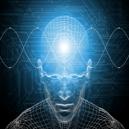Человек не только находится в мире (природе и социуме, влияющем на него и инициирующем либо блокирующем его активность), но и несёт в себе (в мозге, генах, теле, стереотипах поведения) виртуальный оттиск окружающей среды, включая его эволюцию, историю и перспективы. Внешние влияния на каждого из нас и побуждения к действию либо отказу от него глубоко и невидимо со стороны опосредованы процессами, происходящими «под черепом» (выражение Ф.Энгельса) индивида. Информационно-компьютерные технологии позволяют неинвазивно отслеживать, моделировать, корректировать и даже программировать сознание человека, независимо от его желания и воли. Это — новый, бурно формирующийся подход к исследованию психики и мозга, психологии и идеологии, сознания и поведения. Откроет ли он возможность прогнозировать и проектировать сознание и поведение индивида и социальных групп, в частности, в оценке и отношении к политическим процессам не только со стороны расшифровки их внешних проявлений, но и с учётом ситуативного состояния и известной автономности функционирования индивидуальной мозговой ткани? Ещё 100 лет назад научный мир будоражил вопрос о генезисе сознания: выделяет ли мозг мысли, как печень желчь, а почки мочу, или он является уникальным физиологическим фундаментом сознания как универсальной формы активного социального отражения, проектирования и мысленного преобразования окружающего человека мира и себя самого в нём?
Brain, consciousness, and behavior: a view from the depths of the evolution
People not only is the world (nature and society, influencing and initiating or blocking its activity), but also carries (in the brain, genes, body, stereotypes of behavior) a virtual impression of the environment, including its evolution, history, and prospects. External influence on each of us and a call to action or denial from him, deep and invisible from the outside are mediated by processes taking place "under the skull" (Engels's expression) of the individual. Information and computer technologies allow non-invasive tracking, modeling, and even adjust the programming of the human mind, independently of his desires and will. This is a new, rapidly evolving approach to the study of mind and brain, psychology and ideology, consciousness and behavior. Would he open the possibility to forecast and project the consciousness and behavior of individuals and social groups, in particular, in the evaluation of and attitude to political processes not only from the transcripts of their external manifestations, but also taking into account situational status and autonomy of functioning of the individual brain tissue? 100 years ago the scientific world was excited with a question about the Genesis of consciousness: whether the brain secretes thought as the liver bile and the kidneys urine, or is he unique physiological foundations of consciousness as a universal form of social reflection, planning and mental transformation of the surrounding person of the world and yourself in it?
 Ранний опыт государственного строительства большевиков и Конституция РСФСР 1918 года
Ранний опыт государственного строительства большевиков и Конституция РСФСР 1918 года
 7
7
 25458
|
Официальные извинения
25458
|
Официальные извинения
 972
972
 106229
|
Становление корпоративизма в современной России. Угрозы и возможности
106229
|
Становление корпоративизма в современной России. Угрозы и возможности
 239
239
 85138
85138


